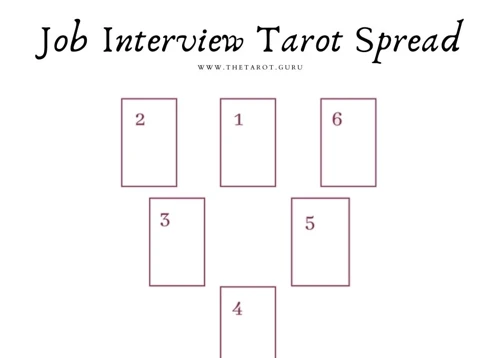Are you preparing for an upcoming interview and looking for that extra edge to ensure success? Look no further than the power of tarot. Tarot, with its rich history and mystical symbolism, can be a valuable tool in not only understanding your own strengths and weaknesses but also in guiding you through the interview process. In this article, we will explore the world of tarot and how it can be used as a step-by-step guide for interview preparation and success. From setting intentions and interpreting cards to gaining confidence and making intuitive decisions, we will delve into all aspects of using tarot to navigate the interview process. So, if you are ready to harness the energy of the universe and unlock your true potential, read on to discover how tarot can be your secret weapon in achieving interview success.
Contents
- Understanding Tarot
- Pre-Interview Tarot Readings
- Preparing for Common Interview Questions
- Gaining Confidence and Overcoming Nervousness
- Using Tarot as a Guide During the Interview
- Conclusion
-
Frequently Asked Questions
- What exactly is tarot?
- How does tarot work?
- Can tarot predict the future?
- Do I need to have psychic abilities to read tarot cards?
- How can tarot help with interview preparation?
- What is the significance of the Major Arcana in tarot?
- How can I interpret tarot cards effectively?
- Can tarot help me make better career decisions?
- Is tarot a reliable tool for decision-making?
- Are there any risks or dangers associated with tarot?
- References
Understanding Tarot
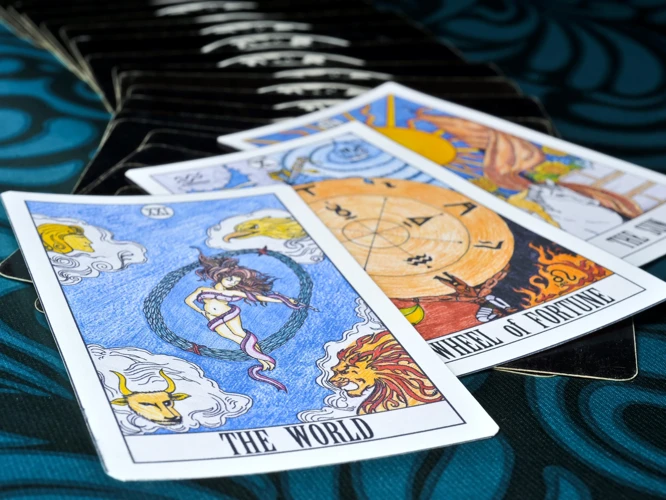
Tarot is a deck of 78 cards that are used for divination and gaining insights into various aspects of life, including career and personal development. Each card in the tarot deck holds its own unique symbolism and meaning, allowing the reader to tap into their intuition and explore the energies surrounding a particular situation or question. The deck is divided into two major sections: the Major Arcana and the Minor Arcana. The Major Arcana consists of 22 cards that represent significant life events and spiritual lessons, while the Minor Arcana consists of 56 cards divided into four suits: Wands, Cups, Swords, and Pentacles. Understanding the basic structure and meaning of each card is essential in unlocking the power of tarot for interview preparation and success.
The exact origins of tarot are shrouded in mystery, but it is believed to have originated in Italy in the 15th century as a card game called tarocchi. Over time, the cards began to be used for divination purposes and their symbolism evolved to incorporate esoteric knowledge and metaphysical concepts. Tarot became especially popular during the 18th and 19th centuries with the rise of the occult and spiritual movements. Today, tarot has become a widely recognized tool for personal growth, self-reflection, and guidance in various aspects of life, including career and decision-making. Understanding the history of tarot can add depth and context to your tarot readings, allowing you to connect with the ancient wisdom and traditions that have been passed down through the generations.
For more insights into the power of tarot in your career, check out our article on Unlocking the Power of Tarot for Career Insights.
What is Tarot?
Tarot is a mystical and intuitive system that uses a deck of 78 cards to gain insights and understanding into various aspects of life, including career and personal development. The tarot deck is divided into two main parts: the Major Arcana and the Minor Arcana. The Major Arcana consists of 22 cards, each representing a significant life event or spiritual lesson. These cards capture the universal archetypes and symbolize the deeper aspects of our human experience. The Minor Arcana, on the other hand, consists of 56 cards divided into four suits: Wands, Cups, Swords, and Pentacles. These cards represent more day-to-day experiences and situations.
When seeking guidance from tarot, the reader shuffles the cards and draws a specific number of cards in a particular pattern called a tarot spread. Each card has its own unique symbolism and meaning, which can be interpreted to provide insights and answers to the questions at hand. Tarot readings can help individuals gain clarity, explore potential outcomes, and make informed decisions. It is important to note that tarot is not a fortune-telling tool, but rather a tool for self-reflection and personal empowerment.
Tarot can be a valuable resource when it comes to navigating career paths, understanding personal passions, and unlocking hidden potentials. By examining the cards and their meanings in the context of career-related questions, individuals can gain valuable insights into their strengths, weaknesses, and opportunities for growth. Whether it’s determining the right career path, exploring new possibilities, or finding fulfillment in existing work, tarot can provide guidance and support.
If you’re interested in leveraging tarot for career guidance, be sure to check out our comprehensive Career Path Tarot Guide for detailed insights and practical tips!
The History of Tarot
The history of tarot is a fascinating journey that spans several centuries and continents. While its exact origins remain a subject of debate, it is believed that tarot cards emerged in the 15th century in Italy as a card game known as tarocchi. Initially, tarot was enjoyed solely for entertainment purposes, commonly played by the upper classes. However, it wasn’t long before people began to recognize the deeper symbolism and potential for divination within the cards.
In the 18th and 19th centuries, tarot experienced a resurgence in popularity as esoteric and occult societies, such as the Hermetic Order of the Golden Dawn, incorporated it into their teachings and practices. During this time, the tarot deck underwent significant transformations, with influential occultists like Arthur Edward Waite and Pamela Colman Smith creating new decks that emphasized the esoteric and spiritual aspects of the cards.
Since then, tarot has continued to evolve and adapt as different cultural and spiritual movements have embraced it. Today, tarot is widely recognized as a powerful tool for self-reflection, guidance, and personal growth. It has found its way into various aspects of life, including career development.
By exploring the history of tarot, we gain a deeper appreciation for the symbolism and wisdom contained within these cards. Understanding the origins of tarot allows us to tap into the ancient knowledge and traditions that have been passed down through generations. It also highlights the enduring appeal and relevance of tarot in our modern world.
If you’re interested in exploring how tarot can help you on your career path and uncover your true passions, check out our article on Tarot for Unlocking Your Career Passions. This insightful guide will show you how to use tarot as a tool for self-discovery and aligning your career choices with your deepest desires and aspirations.
Pre-Interview Tarot Readings
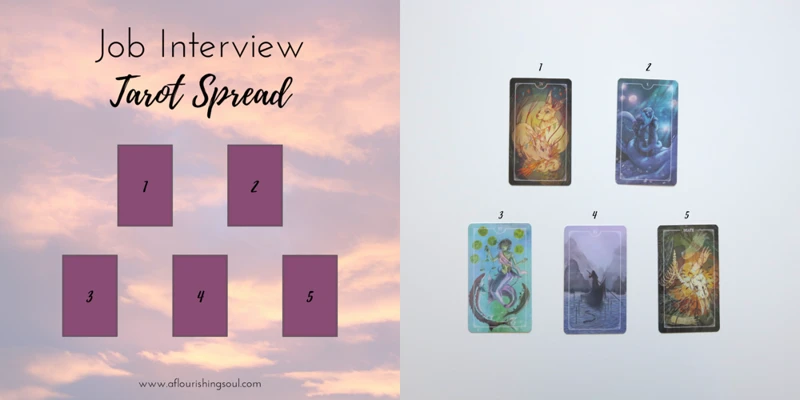
Preparing for an interview can be a nerve-wracking experience, but tarot can offer valuable insights and guidance to calm your nerves and set the stage for success. Here are the key steps to conducting a pre-interview tarot reading:
1. Setting Your Intention
Before starting your tarot reading, take a moment to clear your mind and set a clear intention for what you hope to achieve. Whether it’s boosting your confidence, gaining clarity on potential challenges, or receiving guidance on how to present yourself in the best possible way, expressing your intention will help focus the energy of the reading.
2. Choosing the Right Tarot Spread
Selecting the appropriate tarot spread is vital for addressing specific areas of concern related to your upcoming interview. Consider using spreads such as the Career Path Spread, which focuses on your strengths, weaknesses, and potential outcomes in your professional journey. The Celtic Cross spread is another popular option, providing a comprehensive look at the overall energy surrounding the interview and potential outcomes.
3. Interpreting the Cards
Once the cards have been laid out, it’s time to interpret their meanings in relation to your interview. Pay attention to both the individual cards and the relationships between them within the spread. Each card carries its own symbolism and can provide insights into different aspects of the interview process, such as your preparation, mindset, and potential outcomes. Remember to trust your intuition as you interpret the messages that the cards reveal.
For a more detailed tarot reading guide tailored specifically to your career ambitions, be sure to check out our article on Tarot for Career Passions.
Setting Your Intention
Setting your intention is a crucial step before conducting a tarot reading for interview preparation. By clearly defining your purpose and desired outcome, you align your energy and focus with the cards’ guidance. Begin by finding a quiet space where you can reflect without distractions. Take a moment to center yourself and take a few deep breaths, allowing any stress or anxiety to melt away. Focus your thoughts on the specific goal you want to achieve through the reading, whether it’s gaining confidence, receiving guidance on interview questions, or simply finding a sense of calm and clarity. Visualize yourself succeeding in the interview, feeling confident and prepared. You can even write down your intention in a journal or on a piece of paper and place it under the deck as a symbolic gesture of anchoring your purpose. Remember, setting your intention is about creating a positive and receptive mindset, enhancing the effectiveness of your tarot reading in preparing you for interview success.
Choosing the Right Tarot Spread
Choosing the right tarot spread is crucial to obtain accurate and insightful information for interview preparation. A tarot spread refers to the specific layout or pattern in which the cards are arranged during a reading. Each spread has a different purpose and provides unique insights into different aspects of your interview journey. Here are a few popular tarot spreads that can be helpful:
- The Three-Card Spread: This simple yet versatile spread consists of three cards. The first card represents the past, the second card represents the present, and the third card represents the future. This spread can provide a concise overview of your interview preparation progress and what you can expect in the near future.
- The Career Path Spread: If you’re seeking insights into your career path and how it relates to your interview, this spread can be a valuable tool. It typically consists of five cards laid out in a specific pattern, representing your current career situation, potential obstacles, opportunities, advice, and the possible outcome of the interview.
- The Strengths and Weaknesses Spread: This spread focuses on identifying your strengths and weaknesses specifically for the interview process. It usually involves drawing three or more cards to explore your strengths, areas where you can improve, and how to present yourself confidently during the interview.
When choosing a tarot spread, consider the specific information you’re seeking and the depth of insights you desire. Some spreads are more comprehensive and detailed, while others are more focused on specific aspects. Trust your intuition and choose the spread that resonates with you the most. Experimentation and adapting the spreads to suit your needs are also encouraged. Remember, the most important aspect is to select a spread that allows you to connect with the cards and receive valuable guidance for your interview preparation.
Interpreting the Cards
Interpreting the cards is a crucial skill when it comes to using tarot for interview preparation. Each card in the tarot deck carries its own unique symbolism and meaning, which can provide valuable insights and guidance. To interpret the cards effectively, it is important to consider several factors.
Firstly, pay attention to the individual symbols and imagery depicted on the card. These symbols often hold specific meanings and can help you gain a deeper understanding of the message the card is conveying. For example, the presence of a key symbol might indicate unlocking opportunities or finding solutions, while a bird symbol might represent communication and networking skills.
Secondly, consider the position of the card within the tarot spread. Different positions in a spread can represent different aspects of the interview or the qualities you need to focus on. For instance, a card in the “past” position might indicate past experiences or skills that are relevant to the interview, whereas a card in the “future” position might provide insights into potential outcomes or challenges.
Thirdly, take into account the overall energy and vibe of the card. Is it a card of strength and stability, or does it indicate a need for adaptability and change? Understanding the energy of the cards can help you align your mindset and approach for the interview.
Lastly, trust your intuition. Tarot is a powerful tool for tapping into your own inner wisdom and intuition. Allow yourself to be guided by your instincts and the messages that resonate with you the most, even if they may differ from traditional interpretations.
By considering these factors and developing your interpretation skills, you can gain valuable insights and advice from the tarot cards to enhance your interview preparation and increase your chances of success. Remember, practice and experience will deepen your understanding of the cards and your ability to interpret them effectively.
Preparing for Common Interview Questions
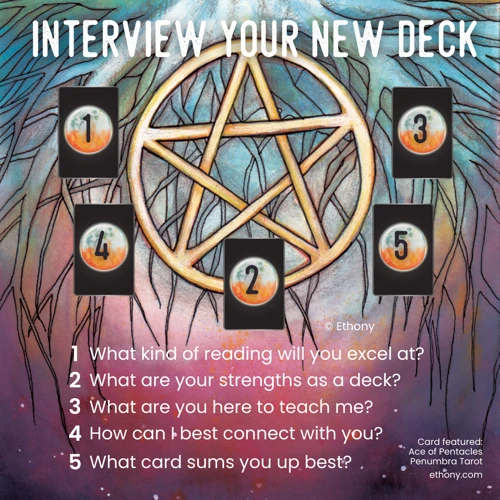
To increase your chances of interview success, it is essential to be well-prepared for the common interview questions that are often asked by hiring managers. Tarot can play a valuable role in helping you anticipate and answer these questions with confidence and clarity. Here are some steps you can follow to prepare for common interview questions using the power of tarot:
1. Set Your Intention: Before diving into the tarot reading, take a moment to set your intention. Clearly state your goal, which is to prepare effectively for the interview and answer questions confidently. This intention-setting process helps align your energy and focus, allowing the tarot cards to provide specific guidance.
2. Choose the Right Tarot Spread: Select a tarot spread that is specifically designed to provide insights into interview questions. For example, the Celtic Cross spread can offer a comprehensive understanding of your strengths, weaknesses, and potential outcomes, while the Three-Card spread can provide quick answers to specific questions. Experiment with different spreads to find the one that resonates with you.
3. Interpret the Cards: When interpreting the tarot cards, pay attention to the symbolism, imagery, and intuitive impressions they evoke. Each card represents different aspects such as strengths, weaknesses, opportunities, and potential challenges. Connect these interpretations with the common interview questions you anticipate and gain valuable insights into how to formulate your answers effectively.
4. Practice Your Responses: Use the guidance from the tarot reading to practice formulating your responses to common interview questions. Focus on highlighting your strengths, addressing any potential weaknesses, and aligning your answers with the specific qualities and experiences the tarot cards have revealed. Practice your responses aloud or with a trusted friend or mentor to build confidence and refine your answers.
By incorporating tarot into your interview preparation, you can gain deeper self-awareness, tap into your intuition, and enhance your ability to articulate your skills and experiences effectively. Remember to approach the tarot reading with an open mind and trust the guidance it provides. With diligent preparation and the mystical guidance of tarot, you’ll be well-equipped to tackle common interview questions and make a lasting impression on your potential employers.
General Interview Questions
General interview questions are the foundation of any interview and provide an opportunity for the interviewer to assess your qualifications, skills, and fit for the role. These questions are usually broad and allow you to showcase your experience, strengths, and personality. Some common general interview questions include:
1. “Tell me about yourself.” This question is often used as an icebreaker and gives you the chance to provide a brief overview of your background, experience, and qualifications. Highlight your key accomplishments and skills that are relevant to the position you’re applying for.
2. “Why are you interested in this position?” This question assesses your motivation and how well you’ve researched the company and the role. Be prepared to discuss specific aspects of the job that align with your interests and career goals.
3. “What are your strengths and weaknesses?” When discussing your strengths, focus on the skills and qualities that are valuable in the role. For weaknesses, choose a genuine area for improvement but also mention steps you’ve taken to overcome it or how you’re working on it.
4. “Describe a challenging situation you faced at work and how you resolved it.” This question assesses your problem-solving skills and ability to handle difficult situations. Choose a relevant example that demonstrates your ability to stay calm, think critically, and find a solution.
5. “Where do you see yourself in five years?” This question evaluates your long-term career goals and ambition. Tailor your response to align with the company’s growth opportunities and show that you’re committed to professional development.
To prepare for general interview questions, take time to reflect on your experiences, accomplishments, and career goals. Practice answering these questions with confidence and clarity, focusing on providing specific examples and highlighting your unique skills and qualities that make you a strong candidate for the position.
For more tips on handling common interview questions, check out our comprehensive Tarot Guide to Nailing Your Career Path.
Behavioral Interview Questions
Behavioral interview questions are becoming increasingly common in job interviews as employers seek to understand not only a candidate’s qualifications and skills but also their past behavior and how they would handle certain situations. These types of questions are designed to assess a candidate’s ability to demonstrate specific competencies and traits such as problem-solving, teamwork, leadership, and adaptability. To effectively prepare for behavioral interview questions using tarot, you can follow these steps:
1. Identify the relevant tarot cards: Review the behavioral competencies typically assessed in interviews, such as communication, decision-making, or conflict resolution. Then, identify tarot cards that align with these qualities. For example, the Queen of Swords may represent effective communication, while the Chariot card could symbolize leadership skills.
2. Create a tarot spread: Develop a tarot spread specifically tailored to the behavioral interview questions you anticipate. Each card position in the spread can correspond to a different competency or scenario. For instance, one card might represent a past situation requiring problem-solving skills, while another card could represent an example of working collaboratively in a team.
3. Interpret the cards: Once you have laid out the tarot spread, interpret the cards based on their meanings and their relevance to the behavioral interview questions. Consider the symbolism, imagery, and messages conveyed by each card. Reflect on how these interpretations relate to your own experiences and skills.
4. Practice your responses: Use the insights gained from the tarot cards to craft thoughtful and meaningful responses to potential behavioral interview questions. Focus on highlighting specific examples from your past that demonstrate the desired competencies or traits. Practice articulating your experiences and the lessons learned from them in a clear and concise manner.
Remember that tarot is not a magical solution but a tool for introspection and self-reflection. It can help you gain insights, build self-awareness, and provide unique perspectives that enhance your preparation for behavioral interview questions. Utilizing tarot in this way can deepen your understanding of your own capabilities and empower you to approach behavioral interviews with confidence and authenticity.
Industry-Specific Questions
Industry-specific questions are a crucial part of any job interview, as they assess your knowledge and expertise in the field. Tarot can be a valuable tool in helping you prepare for these industry-specific questions. Here’s how you can use tarot to gain insights and prepare yourself for success:
1. Research and identify key topics: Before your interview, take some time to research and identify the key topics relevant to your industry. This could include trends, technologies, regulations, or any other crucial aspects of your field.
2. Choose corresponding tarot cards: Once you have identified the key topics, choose tarot cards that correspond to each topic. For example, if you are interviewing for a marketing position, you can choose the “The Magician” card to represent your creativity and ability to think outside the box.
3. Interpret the cards: Study the selected cards and their meanings in relation to the industry-specific questions. Reflect on how the symbolism and messages of the cards can provide insights or guidance in answering those questions. This exercise can help you think more deeply about the topics and develop well-rounded and thoughtful responses.
4. Practice with mock interviews: To further enhance your preparation, consider practicing with mock interviews. During these interviews, use the tarot cards as a guide to help you formulate strong and precise answers to industry-specific questions. This practice will boost your confidence and ensure that you are well-prepared to address any inquiries related to your field.
Remember that tarot is not meant to predict the future or give you exact answers, but rather to provide guidance and insights that can help you navigate challenges and make informed decisions. By incorporating tarot into your interview preparation, you can tap into your intuition, gain a deeper understanding of the industry, and present yourself as a knowledgeable and confident candidate.
To learn more about using tarot to align your career with your passions, check out our article on Tarot and Career: Unleashing Your Passions.
Gaining Confidence and Overcoming Nervousness
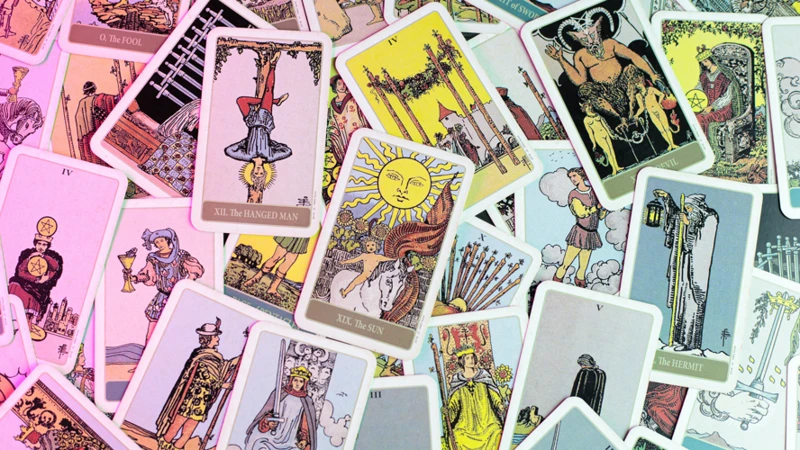
Gaining confidence and overcoming nervousness are crucial factors in interview success, and tarot can be a powerful tool in achieving this mindset. One way to boost your confidence is through tarot affirmations. Affirmations are positive statements that help reprogram your subconscious mind and instill a sense of belief in your abilities. Before your interview, take a few moments to sit quietly and focus on the cards that represent strength, confidence, and success, such as the Emperor, the Sun, or the Queen of Wands. Choose one or two cards that resonate with you and repeat their affirmations, such as “I am confident and capable,” or “I shine brightly in every situation.” These affirmations will help shift your mindset and align your energy with confidence and self-assurance.
Meditation and visualization are also powerful techniques for overcoming nervousness. Find a quiet space where you can relax and center yourself. Close your eyes and take deep, calming breaths. As you breathe in, imagine yourself inhaling confidence and calmness, and as you exhale, release any tension or nervousness. Visualize yourself entering the interview room with a calm and confident demeanor. See yourself answering questions effortlessly and showcasing your skills and qualifications. By regularly practicing meditation and visualization techniques, you can train your mind to remain calm and focused, allowing you to perform at your best during the interview.
To dive deeper into the world of tarot and career guidance, check out our comprehensive Tarot Career Guide for a step-by-step approach to unlocking your true potential.
Tarot Affirmations
Tarot affirmations are powerful statements that you can use alongside your tarot practice to cultivate a positive mindset and enhance your confidence for interviews. Affirmations are declarations of positive intent that help shift your thoughts and energies towards your desired outcome. When used in conjunction with tarot, they can be even more potent in reinforcing positive beliefs and intentions.
To create tarot affirmations, start by selecting a card from your tarot deck that represents the qualities you wish to embody during your interview. For example, if you want to exude confidence and professionalism, you might choose a card like the King of Wands. Next, formulate a strong affirmative statement related to the chosen card. For instance, you could say, “I am confident, skilled, and radiate professionalism during my interview.”
Once you have your affirmation, it’s important to repeat it daily, preferably in front of a mirror, to reinforce it in your subconscious mind. Visualization can also be incorporated into the practice by closing your eyes and imagining yourself embodying the qualities represented by the chosen card. Visualize yourself acing the interview, answering questions with ease, and radiating confidence.
In addition to creating your own tarot affirmations, you can also find pre-made affirmations that are specifically tailored to tarot and interview success. These can be found in books, online resources, or by consulting with a tarot professional or coach. Remember, the key to effective affirmations is repetition and belief in their power. By incorporating tarot affirmations into your interview preparation routine, you can tap into the transformative energy of the cards and boost your confidence and performance during the interview process.
Meditation and Visualization
Meditation and visualization are powerful techniques that can help you gain confidence and overcome nervousness before an interview. By quieting your mind and focusing your thoughts, you can enhance your concentration, reduce anxiety, and tap into your inner strength. To incorporate meditation into your interview preparation, find a quiet and comfortable space where you can relax without distractions. Close your eyes, take a few deep breaths, and allow your body and mind to relax. You can choose to meditate on a specific intention, such as confidence or clarity, or simply focus on calming your thoughts. Visualizations can also be used to enhance your interview performance. Close your eyes and imagine yourself walking into the interview room, feeling confident and prepared. Visualize yourself answering questions with ease, making a positive impression on the interviewer, and ultimately receiving a job offer. By practicing meditation and visualization regularly, you can train your mind to stay focused and calm during the actual interview, increasing your chances of success.
Remember that these techniques are not meant to guarantee a specific outcome, but rather to support your overall interview preparation. They can help you enter the interview with a clear and confident mindset, enabling you to present your best self and leave a lasting impression on the interviewer.
Take a moment to explore our comprehensive guide on tarot and career paths in our article “Tarot and Your Career Path: A Guide”.
Using Tarot as a Guide During the Interview
Using Tarot as a Guide During the Interview:
During the interview itself, tarot can serve as a powerful tool in guiding your decision-making and providing insights into the energy of the interviewer. Here are a couple of ways you can use tarot to enhance your interview experience:
1. Intuitive Decision-Making: Tarot can help you make intuitive decisions during the interview by providing guidance and clarity. Before the interview, draw a card that represents a positive outcome or a quality you want to embody during the interview, such as confidence or clear communication. Keep this card with you as a reminder and reference throughout the interview process. During the interview, you can reflect on the card’s energy and use it as a guide when making decisions or answering questions. Trust your intuition and let the tarot card influence your decision-making process.
2. Tuning into the Energy of the Interviewer: Tarot can also help you tune into the energy of the interviewer, allowing you to respond more effectively and build rapport. Before the interview, take a few moments to center yourself and visualize a positive and harmonious connection between you and the interviewer. Draw a card to represent the energy of the interviewer or what they might be seeking in a candidate. Use this card as a focal point to guide your interactions and tailor your responses accordingly. Pay attention to any intuitive impressions or insights you receive as you engage with the interviewer.
Remember, tarot is not a magical solution that guarantees interview success. It is simply a tool that can help you tap into your intuition and gain additional insights during the interview process. Ultimately, your skills, qualifications, and preparation are what will determine your success. Trust in yourself and use tarot as a supportive aid to enhance your interview experience.
Intuitive Decision-Making
Intuitive decision-making is a valuable skill that can be enhanced through the use of tarot during an interview. Tarot cards can provide insights and guidance when it comes to making important decisions in your career. During the interview, there may be situations where you need to think on your feet or make choices based on limited information. This is where tapping into your intuition can be incredibly helpful.
One way to incorporate intuitive decision-making with tarot is to pull a card or a small spread before responding to a question or making a decision. By focusing on the question in your mind and shuffling the deck, you can invite your intuition to guide you in choosing the right card. The card that presents itself can offer insights, messages, or even a gut feeling that can assist you in making a more informed decision.
For example, if you are asked a question about how you would handle a challenging situation in the workplace, you can draw a tarot card and reflect on its symbolism. The card may reveal qualities or approaches that can help you formulate a thoughtful and strategic response. Trusting your intuition in this way allows you to tap into your own inner wisdom and confidently navigate the interview process.
Another technique for intuitive decision-making is to use a tarot spread specifically designed for decision-making. This type of spread offers a structured layout that explores different aspects of the decision at hand. Each position in the spread represents a different factor or perspective to consider, such as pros and cons, potential outcomes, or underlying influences. By placing cards in each position and interpreting their meanings, you can gain a deeper understanding of the situation and make a decision that aligns with your intuition.
Interested in using tarot to guide you along your career path? Check out our comprehensive Tarot Career Path Guide for more insights.
Tuning into the Energy of the Interviewer
Tuning into the energy of the interviewer can provide valuable insights during an interview and help you navigate the conversation more effectively. Here are a few techniques to help you connect with and interpret the energy of the interviewer:
1. Non-verbal cues: Pay attention to the interviewer’s body language, facial expressions, and tone of voice. These subtle cues can reveal a lot about their thoughts and emotions. For example, if the interviewer maintains eye contact and nods along with your answers, it may indicate that they are engaged and receptive. On the other hand, if they seem distracted or exhibit closed-off body language, it could mean they are disinterested or skeptical.
2. Listening to their words: Beyond the content of their questions, listen to the tone and choice of words used by the interviewer. Are they asking probing, challenging questions or more relaxed, open-ended ones? This can give you a sense of their expectations, priorities, and overall demeanor.
3. Energetic presence: Pay attention to the overall energy in the room during the interview. Trust your intuition and tune into any subtle shifts or vibes you may perceive. Sometimes, you may get a gut feeling about the interviewer’s intentions or the overall atmosphere, which can guide your responses and help you establish a stronger connection.
4. Adapting your communication: As you pick up on the interviewer’s energy, adjust your communication style accordingly. If they appear more formal and structured, it may be best to provide concise and direct answers. On the other hand, if they seem more relaxed and conversational, you can engage in a more casual and friendly manner.
Remember, tuning into the energy of the interviewer is not about making assumptions or judgments. Rather, it’s about being attuned to the subtle dynamics at play and using that awareness to create a stronger connection and rapport. When you can align your own energy with that of the interviewer, it can contribute to a more positive and impactful interview experience.
For more tips on utilizing tarot to enhance your career path, check out our informative article on The Tarot Guide to Finding Your Career Path.
Conclusion
In conclusion, tarot can be a valuable tool in your interview preparation and success. By setting your intention, choosing the right tarot spread, and interpreting the cards, you can gain valuable insights into your strengths, weaknesses, and areas for improvement. Tarot can also help you prepare for common interview questions by providing guidance on how to approach general, behavioral, and industry-specific inquiries. Additionally, tarot can aid in boosting your confidence and overcoming nervousness through the use of affirmations, meditation, and visualization techniques. During the interview itself, tarot can serve as a guide by helping you make intuitive decisions and tune into the energy of the interviewer. By tapping into the power of tarot, you can approach your interviews with a sense of clarity, focus, and inner strength. Remember, tarot is not meant to predict the future, but rather to provide guidance and insight into the present moment. So, trust in your intuition, harness the energy of the cards, and let tarot be your ally in achieving interview success.
For more guidance on tarot and career path, be sure to read our comprehensive Tarot Guide for Career Path and discover how tarot can help you uncover your true passions and purpose.
Frequently Asked Questions
What exactly is tarot?
Tarot is a deck of 78 cards that are used for divination and gaining insights into various aspects of life, including career and personal development.
How does tarot work?
Tarot works by tapping into your intuition and connecting with the energies surrounding a particular situation or question. The cards are interpreted based on their symbolism and the reader’s intuition.
Can tarot predict the future?
Tarot is not meant to predict the future with absolute certainty. It is more like a guide that can provide insights, suggestions, and potential outcomes based on the current energies and circumstances.
Do I need to have psychic abilities to read tarot cards?
No, you don’t need to have psychic abilities to read tarot cards. While intuition plays a significant role, anyone can learn to read tarot with practice and study.
How can tarot help with interview preparation?
Tarot can help with interview preparation by providing insights into your strengths, weaknesses, and potential obstacles. It can guide you in setting intentions, choosing the right approach, and gaining confidence for a successful interview.
What is the significance of the Major Arcana in tarot?
The Major Arcana represents significant life events and spiritual lessons. It symbolizes major milestones, inner growth, and transformation.
How can I interpret tarot cards effectively?
Interpreting tarot cards effectively requires practice and developing a personal connection with the symbolism of the cards. It’s important to trust your intuition and listen to the messages that come through during a reading.
Can tarot help me make better career decisions?
Yes, tarot can help you make better career decisions by providing clarity, insights, and guidance. It can help you gain a deeper understanding of your passions, talents, and potential paths to pursue.
Is tarot a reliable tool for decision-making?
Tarot can be a reliable tool for decision-making when used as a guide along with logical reasoning and practical considerations. It can provide different perspectives and shed light on hidden aspects of a situation.
Are there any risks or dangers associated with tarot?
Tarot is generally considered safe, but it’s important to approach it with respect and positive intentions. It is not advisable to overly rely on tarot or make major life decisions solely based on a reading.
